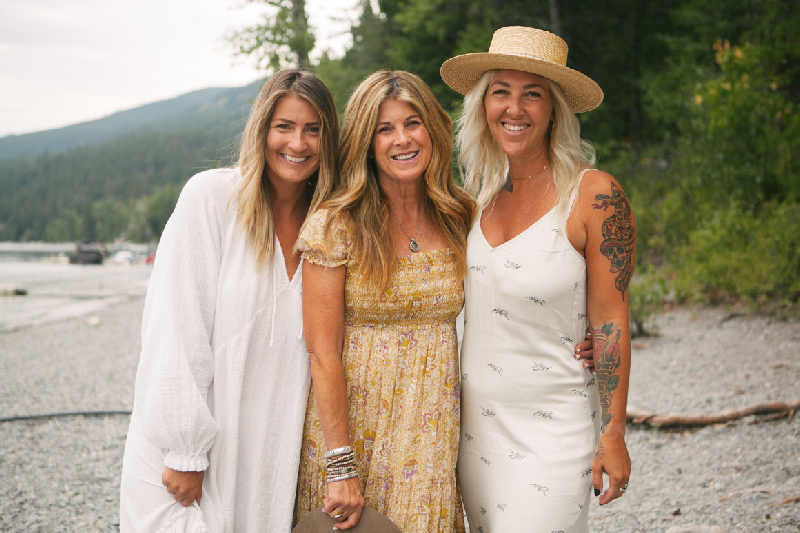to moms with married children

“How many mothers-in-law does it take to change a light bulb?”
“One. She just holds it up there and waits for the world to revolve around her.”
Listen to enough conversations among women and, sooner or later, you’ll hear comments about someone’s mother-in-law.
Mothers-in-law get a bad rap—sometimes deservedly so! But not always. Being one myself, I thought I’d jot down a few thoughts on the subject.
In the early years, with two growing boys (three if you count Greg!) our family developed quite a guy-culture. Life in the Laurie house came with a certain decibel level and a distinct way of doing things. There were motorcycles, surfboards, skateboards, and enough Star Wars figures and spaceships to keep George Lucas very happy.
I was outnumbered three to one—that is, until my sons married and gave me the joy of welcoming other women into this Laurie circle. Daughters-in-love who loved my sons and opened their hearts to me. Together they have given me the great blessing of five grandchildren. Now the boys in our family are outnumbered, 5 to 4, with the girls leading by one!
This blessing of daughters has come with important life-lessons, like appreciating and honoring different ways of parenting, feeding a family, and managing a house. Over the years, I’ve learned some things the hard way. When I try to step into the role only God deserves, I can really mess things up.
In my role as mother-in-law and grandmother, some things remained consistent while other things had to change. I have learned to celebrate that their families do things differently than I did—and wow, it’s been exciting to see that unfold. They have excelled in so many ways and taught me quite a lot!
I have come to know, time and again, that my experience and knowledge is rather limited. Thank goodness I can step back, knowing that the way I do things isn’t the only way of getting the job done.
I am happy (gobsmacked!) when one of my daughters-in-love calls to ask for a recipe, or advice on nursing a sick child, or the brand of laundry whitener I prefer. Still, I am determined to not be the kind of mother-in-law that has an opinion on every subject, offering advice when it’s not asked for. I’m embarrassed to say that it’s taken me a long time to understand this, but it’s true.
Except in very rare situations, giving someone advice when it hasn’t been asked for just doesn’t work, no matter how noble your intentions. So the rule is: if someone doesn’t ask, don’t give advice. This applies to just about everything short of stopping them from stepping in front of a moving car!
The impact of your advice goes beyond just what you say. It’s also when and how you say it.
Scripture is very clear on this point. “My dear brothers and sisters, take note of this. Everyone should be quick to listen, slow to speak and slow to become angry, because human anger does not produce the righteousness that God desires” (James 1:19-20 NIV).
Quick to listen. Slow to speak.
What a hugely important warning! This does not mean that I disconnect or ever abandon them. It does mean that I will watch and pray and stand ready to help—when asked. What I do strive for is to be more intentional and consistent in prayers for my family. Entrusting them to God, not to myself, for He alone is sufficient.
“Look to the Lord and His strength; seek His face always” (1 Chronicles 16:11).
I recall how it felt to be a new wife, a new mother, and how wonderful it was to be invited but never “summoned” to my mother-in-law’s holiday gatherings. I was not lectured on how to diaper or discipline my kids. And while I have been married longer, and a mom longer, this desire to play the mom card must be resisted.
My son belongs to my daughter-in-love. I respect the words that the Bible uses about a man leaving and cleaving to his wife—not his mommy!
Genuine love cuts across all of my natural tendencies to control and protect. It negates my own cherished job description as God’s forever “official Mom” representative.
So, this I say to all my fellow (and soon to be) mothers-in-law: Let us determine to free our married children to establish the habit of looking to God for themselves, and then to each other, for all that they need.
And we certainly can learn a thing or two ourselves, in the process.








18 comments
Patsy | August 12, 2021
Very wise advice and perfectly stated! I wish I would have known this earlier in life!
Kathleen Gaeding | August 17, 2021
Cathie, your words are so wise. My oldest son was married 17 years ago. I had a rocky start with my mother-in-law for several reasons. But, over the years we became close. I believe in the words of James 1:19 and 20. These verses have helped me so much in my relationship with my son and his wife.
Carol Branstine | August 17, 2021
Excellent article
Leave a comment
Leave a comment
Leave a comment
Janice Goodnight | August 17, 2021
SO GOOD! When I saw the title, I rushed and was excited to hear what you had to say! I think this is the first thing I have ever read about being the mother in law.....keep 'em coming, Cathie!! LOVE IT!!!
Leave a comment
Susan Mills | August 17, 2021
Love this Cathe, I know you well and truly you have been that excellent Mother-in-love to those girls. You love with your heart and your hands open and I know your daughters-in-love are so grateful to have you my friend ♥️
Leave a comment
Laurie Duininck | August 17, 2021
Thank you! I appreciate your comments on listening and not giving advice unless asked. I also have grown into this thinking after sometimes not waiting. Every time I kept my mouth shut later I was very
glad I did. God was guiding them and they are usually smarter than me. I also think our generation has
to be open to learning from them like you said and from our grandchildren. I want to always keep listening and learning. PS I have 3 daughters but most of this totally applies to them as well.
Leave a comment
Pat Halaszyn | August 17, 2021
I love this and can so relate! So much wisdom here and Thankyou for sharing Cathe! I acquired a lovely daughter in law 10 years ago and she, over time became a true "daughter of my heart". I learned so much from her over time. Sadly this past feb. my son and his wife were divorced. Its been a long and painful journey because even though a piece of paper says they are no long married, my heart says differently. I grieve daily this daughter that is no long a part of my life. God is faithful and is teaching me much and we are learning from our son as well. Anyway, we are praying much, God is good and we are so thankful for Harvest. I am part of one of the on-line groups and love it! Thank you Cathe for all you do! love, Pat Halaszyn
Leave a comment
Melissa Adargo | August 17, 2021
Perfect timing to get this in my email! I am literally visiting my adult, married daughter and her family. Although I’m the mother in law to her husband and she is my own, it’s still imperative to keep my mouth shut when advice is not requested. Their marriage is a complete mess and I just wish I knew how to advise her on how to handle it. This reminds me that the only answer I have is prayer. I will continue to hit my knees for their marriage and family.
Leave a comment
Sheri | August 17, 2021
How I praise God for your timely
message
I prayed -God answered
Thank you for sharing words of wisdom .
By the way I also wanted to let you know “As I See It” I’m so thankful you wrote it .
God bless ♥️
Leave a comment
Amelda Ratcliffe | August 17, 2021
I'm soon to have a daughter in love. And this is great advice 👍
I do pray for them but now it's closer to my heart. Leave and cleave.
Thanks sister Laurie
Leave a comment
Karen Flowers | August 17, 2021
Great advice!
Leave a comment
Debbie Zamora | August 17, 2021
Hi Cathe. It's good to hear from you! Thank you so much for this I'm mom and have two Daughters in loves and one Son in law and 7 grandchildren your right they belong to each other...I appreciate this.. God is with us and for us 💕
Thank you,
Debbie.
Leave a comment
Patty | August 17, 2021
Cathie, what a blessing God has with His timing when we need to be reminded of His great Glory. I am a mother of 3 sons and a mother in law of 2 wonderful ladies and grandma of 3 beautiful girls!
It is a challenge but I am praying and trying very hard to listen and be silent.
Thank you for your message, praying on your words.
Leave a comment
Kim Norris | August 17, 2021
I am a former mother-in-law to 2 women who I still consider daughters and who will always be my grandchildren’s mothers. We have been able to keep the love going as women who love and care about each other. When they were married to my sons I stumbled way too many times in the area of well-intended advice. What I know is that God is so gracious in guiding us through relationship dynamics if we follow His instruction. James 1:19-20 is the complete package. Thank you for your share.
Leave a comment
Brenda Kammerer | August 18, 2021
Thank-you so much for this. As I read this article; I realized how little I see written for older women, mothers-in-law, mothers of grown sons and daughters, and daughters who are caring for or losing or have just lost their earthly parents.
Your statement that you ‘stand ready to help’ pretty much describes the position that we as women assume as we step back from active, nurturing motherhood, as well as so many other relationships. I am finding that the places where our involvement is welcomed are often outside our home and family. Sometimes that makes me sad. We have so much life experience to draw on, so many lessons learned, and so much to share... if only....
And so I pray... for my family and for God’s direction and guidance... that He will move me to where I am needed.
Please... more for us mature women...
Thank-you!
Leave a comment
Cassie Stockstill | August 18, 2021
Thank you for this beautiful reflection in wisdom! With sons entering this phase of life, I am definitely taking notes from godly examples!
Leave a comment
Annette | August 19, 2021
This was perfect, I loved this. Thank you for your insightful words.
Leave a comment
Tricia Bergman | August 19, 2021
Excellent post! Absolutely 100% true. Love reading your posts. I pray for you and Greg and family every day. Blessings on all of you forever! :-)
Leave a comment
Christine | September 4, 2021
God’s timing is perfect! Thank you so much for sharing your wisdom. As my son is courting and desires to marry.
Leave a comment
Deb | October 21, 2021
Cathe, This couldn’t have come at a more needed time. Really struggling with what my role is as a mom of adult ‘kids’ who no longer need me or my advice. I appreciate the wisdom. I’ll read this first when I’m tempted to give unasked for advice.
Leave a comment
Leave a comment